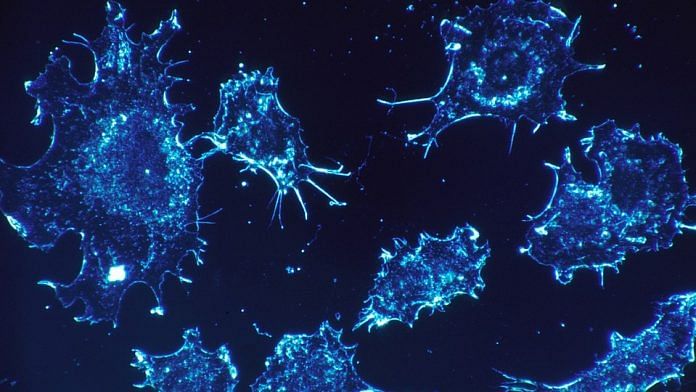Bengaluru: Researchers at Indian Institute of Technology (IIT)-Madras have developed a machine learning (ML) algorithm to identify personalised genes that have the potential to form and drive cancer in individuals. The model uses a ‘multiomic’ approach, the combined study of intersectional studies that end with the suffix ‘-omics’.
Details of the algorithm were published in a peer-reviewed paper in the journal Frontier in Genetics last month.
The findings are expected to help in devising more personalised cancer therapies, contributing to the growing field of targeted therapy and immunotherapy trials.
Called ‘Personalized Identification of driVer OGs and TSGs’, or PIVOT, the model identifies personalised drivers of cancer genes and classifies them as either tumour suppressor genes (TSG) or oncogenes (OG) — the two types of genes involved in cancer.
The algorithm has also identified rarer driver genes that have not been studied enough to be associated with some cancers in large pan-cancer databases.
ML works by consuming large datasets and understanding previously identified patterns. It then applies logic to identify new patterns in new (or existing) data.
For this study, the IIT-Madras researchers worked on datasets that contained genomes of individuals with four kinds of cancers — breast cancer, colorectal adenocarcinoma, lower grade glioma (brain tumours), and lung adenocarcinoma — and their identified driver genes and mutations.
The model classified genes as neutral or drivers, and further labelled them into TSGs and OGs.
It also identified other trends in data and newer driver genes from medical literature.
“It is difficult to predict how well we can train and predict genes in unseen cancer types,” said Malvika Sudhakar, lead author of the paper, to ThePrint. “A lot of factors, such as the number of samples, influence the performance of the model.”
“We built models on four datasets using mutation data and models on three datasets for the multi-omic data. While the metrics cannot be compared between cancer types, we find performance for breast cancer is better than other cancer types,” she added. “Interestingly, the number of samples for breast cancer used for training the models was twice the number of samples from any other cancer.”
Also read: Experimental drug shows success in advanced breast cancer patients, better than standard chemo
Driver genes
A cancer driver gene is one whose mutations increase the net cell growth in our body beyond normal, leading to formation of tumours and cancers.
These genes that are involved in the cancer-driving mechanism are either tumour suppressors or oncogenes. TSGs regulate the cell during replication and division, preventing uncontrollable growth resulting in a tumour. When TSG mutates, it results in loss of function, i.e. it gets turned off, enabling tumour development.
Oncogenes are those that can cause cancer when activated. When a cell malfunctions, it is naturally programmed to die. But when oncogenes are unregulated or ‘have gain of function’, i.e. are activated by way of a mutation, malfunctioning cells survive and turn cancerous.
These mutations are somatic, indicating that they are not inherited genetically. Some genes, like TP53 and PIK3CA, are drivers for multiple types of cancer.
Cancers that have been widely studied have many identified driver genes, and thus also have genetic tests that can estimate the potential for a person to develop cancer in their lifetime.
Other ML models that are used to predict driver genes utilise an unsupervised approach, where the input data has not been labelled. Additionally, they also do not identify whether a detected gene is TSG or OG.
Also read: Why keto diet does not restrict tumour growth & an ancient predator is now a timid herbivore
The PIVOT algorithm
The IIT-Madras researchers trained their PIVOT model with existing validated data sets, reaching high levels of accuracy for predicting the drivers of breast cancer, colorectal cancer, and lung cancer.
The model uses a supervised approach, with input data labelled, and also labels genes as TSG and OG.
Apart from the identified driver genes, the algorithm also detected new genes like PRKCA, SOX9, NFKBIA, and PSMD4, which are not already present in large databases but have been found in fewer, or newer, studies.
“Recent pan-cancer research shows that there are tumours with no mutations in known cancer-causing genes,” said Sudhakaran.
“When we analyse our three cancer types, we find frequently altered new cancer-causing genes that are not included in the list of known cancer-causing genes. In BRCA (breast cancer), 50 per cent of the top 10 frequently identified genes are newly cancer-causing genes. For colon adenocarcinoma and lung adenocarcinoma, two out of the top 10 genes are new cancer-causing genes.”
There are also genes that are personalised and specific to an individual rather than to all individuals in a study, which help in identifying sub-types of certain cancers as well.
“Cancer-causing genes are usually studied for a cancer type or a cohort of patients,” said Sudhakar. “By understanding cancer-causing genes at an individual level, we can identify rare genes observed in as few as a single sample and missed out by previous methods. These rare cancer-causing genes are new targets to be studied and validated in experimental studies.”
The identification of these personalised driver genes helps deliver targeted therapies to people who have cancers without known mutations.
Such therapies targeted at cancer patients with specific mutations have shown promising results, with a breast cancer trial reaching unprecedented success with tumour growth, and a colorectal cancer trial reaching 100 per cent remission.
(Edited by Zinnia Ray Chaudhuri)
Also read: US man with transplanted pig heart likely died due to virus that doesn’t infect humans



